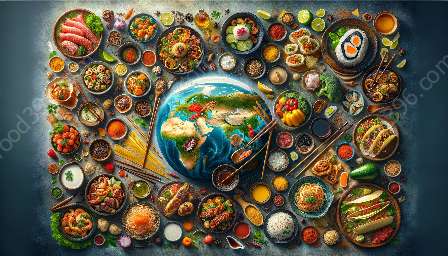Food sustainability is a pressing global issue that has gained significant attention in recent years. It encompasses the environmental, social, and economic aspects of food production, distribution, and consumption. In this comprehensive exploration, we will delve into the concept and importance of food sustainability and its relevance to the comparative study of world cuisines.
As we embark on this journey, we will examine how different culinary traditions around the world reflect and contribute to food sustainability. From indigenous practices to modern culinary innovations, each cuisine offers unique insights into sustainable food systems and the impact of food and drink on the environment and society.
The Importance of Food Sustainability
Food sustainability revolves around the idea of meeting the needs of the present without compromising the ability of future generations to meet their own needs. It encompasses various interconnected elements such as ecological balance, social equity, and economic viability.
At its core, food sustainability emphasizes the responsible use of natural resources, reduction of food waste, promotion of fair labor practices, and support for local food systems. By embracing sustainable practices, individuals, communities, and businesses can mitigate the negative impact of food production on the environment and foster greater resilience in the face of global challenges such as climate change and food insecurity.
Comparative Study of World Cuisines
The comparative study of world cuisines provides a rich tapestry of culinary diversity, revealing the intricate connections between food, culture, and sustainability. By exploring the unique ingredients, cooking techniques, and dietary traditions of different regions, we gain valuable insights into how food sustainability is woven into the fabric of each culinary heritage.
From the Mediterranean diet's emphasis on fresh produce and olive oil to the plant-based staples of East Asian cuisines, we can draw parallels and contrasts that shed light on sustainable food choices and dietary patterns. Through a comparative lens, we can appreciate how various cuisines have evolved in harmony with their natural surroundings, adapting to local resources and climate conditions while preserving culinary traditions for future generations.
The Impact of Food and Drink
When considering food sustainability, it is essential to recognize the intricate relationship between what we consume and its broader implications. The choices we make regarding food and drink have far-reaching consequences, influencing environmental sustainability, animal welfare, and human well-being.
From the carbon footprint of agricultural production to the social justice issues inherent in food supply chains, our consumption patterns play a pivotal role in shaping the future of food sustainability. By understanding the impact of our dietary choices, we can make informed decisions that support sustainable food systems and contribute to positive changes in the global food landscape.
Exploring Sustainable Practices
Throughout our exploration of food sustainability and world cuisines, it's crucial to highlight specific sustainable practices that exemplify the principles of environmental stewardship, cultural preservation, and ethical food production. Whether it's the regenerative farming methods practiced in Nordic cuisine or the preservation techniques found in South American culinary traditions, each cultural context offers valuable lessons in sustainable living.
From farm-to-table movements and community-supported agriculture to the preservation of heirloom seeds and traditional food knowledge, sustainable practices are not only about minimizing harm but also about fostering positive, regenerative change within food systems. By celebrating these practices, we honor the diversity and resilience of culinary traditions while promoting a more sustainable, equitable food future.
Conclusion
Food sustainability is a multifaceted concept that intersects with the comparative study of world cuisines in profound ways. By recognizing the importance of sustainable food practices and their reflection in different culinary traditions around the world, we can deepen our appreciation for the diverse cultural expressions of food sustainability and work towards building a more resilient and inclusive global food system.

